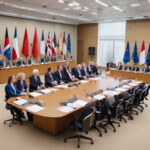In a landmark decision, Meta, the parent company of Facebook and Instagram, has reached an agreement with German regulatory authorities to implement significant changes to its data collection practices. This agreement follows a thorough investigation initiated by the German Federal Cartel Office, aimed at addressing concerns over how Meta manages user data.
The president of the German Federal Cartel Office, Andreas Mundt, announced that one of the most crucial aspects of this agreement is the company’s commitment to stop requiring users to consent to the unrestricted collection and linking of data to their accounts. Instead, under the new framework, data that is not created via Meta’s services will not be automatically associated with a user’s account unless explicit consent is given. This move is expected to enhance user privacy and limit the scope of Meta’s data collection practices in Germany.
The implications of these changes are profound. By establishing stricter consent protocols, Meta aligns itself with the tightening regulatory landscape in Europe, particularly in light of heightened scrutiny directed at major tech firms. The decision is part of a broader initiative among European regulators to closely monitor the data practices of large technology companies. The collaborative effort between Meta and German authorities could serve as a benchmark for future regulations across Europe.
For consumers, the benefits of these changes are tangible. Users of Facebook and Instagram in Germany will enjoy increased privacy protections. They can now navigate these platforms with a greater assurance that their data will not be treated as a default asset for marketing or advertising strategies without their express permission. This initiative represents an important step towards restoring user trust, which has been declining in the wake of several high-profile data breaches and privacy violations in recent years.
Data privacy advocates have welcomed the agreement as a positive development. The balanced approach aims to protect user interests while allowing Meta to continue operating within a legal framework that emphasizes accountability and transparency. This development underscores the ongoing importance of data protection regulations in shaping the practices of technology companies globally.
Moreover, the agreement with German authorities is seen as a potential catalyst for similar negotiations in other EU member states. If successful, this could lead to a harmonized framework for data privacy that could reshape how technology firms like Meta operate, both in Europe and worldwide.
This shift is significant for various stakeholders, from individual users to businesses relying on Meta’s platforms for advertising. It encourages a culture of consent-first engagement, implying that companies will need to rethink their data strategies and user engagement processes to comply with these regulations.
Investors and analysts are also paying close attention to this development. The landscape of social media and online advertising is rapidly changing, and companies that can navigate these regulatory challenges successfully will likely gain a competitive advantage. As Meta adapts to this new regulatory environment, it may have to develop innovative solutions that prioritize user consent while still providing value to advertisers.
Looking to the future, Meta’s agreement with the German Federal Cartel Office sets a precedent that may influence global data practices. Other countries and regions are observing how this unfolds, which could lead to changes in data legislation and corporate compliance worldwide.
Ultimately, this case emphasizes the growing necessity for tech companies to embrace user-centric policies regarding data privacy. As user awareness increases, businesses must prioritize ethical data practices to retain consumer trust and loyalty. Meta’s efforts in Germany illustrate how proactive engagement with regulators can yield positive outcomes for both corporations and consumers, setting the stage for a more transparent digital landscape.











